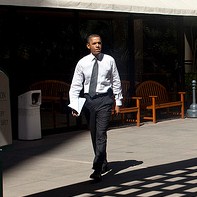The U.S.-Russian negotiations over Syria’s chemical weapons, now underway in Geneva, will determine whether President Barack Obama can walk back his threat to launch punitive strikes against the regime of Syrian President Bashar al-Assad. But they will also impact the paradigm for addressing WMD elsewhere, particularly Iran. Depending on the outcome of the talks over Syria, the U.S. could find itself with new options for negotiating a deal to resolve the standoff over Tehran’s nuclear program—or find the door to a peaceful outcome firmly shut.
U.S. officials have characterized the Russian plan to secure Syrian chemical weapons as "doable but difficult," and Syrian President Bashar al-Assad has publicly declared that "Syria is placing its chemical weapons under international control." Ongoing Russian-American meetings in Geneva are designed to provide the framework for any deal and to set down the parameters for how it would be implemented in practice, with both countries bringing to the talks not only diplomats but also intelligence personnel and specialists in securing and destroying chemical weapons.
The plan was generated from comments made by Secretary of State John Kerry at the beginning of the week that were then developed by Russian Foreign Minister Sergey Lavrov into an outline for a diplomatic initiative and proposed to Syrian Foreign Minister Walid Moallem. By providing a third way between taking military action and letting the Aug. 21 incident pass without reaction, the proposal became a lifeline for the Obama administration, which was finding it incredibly difficult to rally international and domestic support for a military strike on Syria. There are, however, no guarantees that the plan will work. There are major impediments to a successful outcome, among them whether the United States will have confidence in Syria to in fact turn over all of its weapons stockpiles; the availability of accurate U.S. intelligence to determine if cheating is taking place; and the technical and logistical challenges of implementing a disarmament program in the midst of a civil war.

